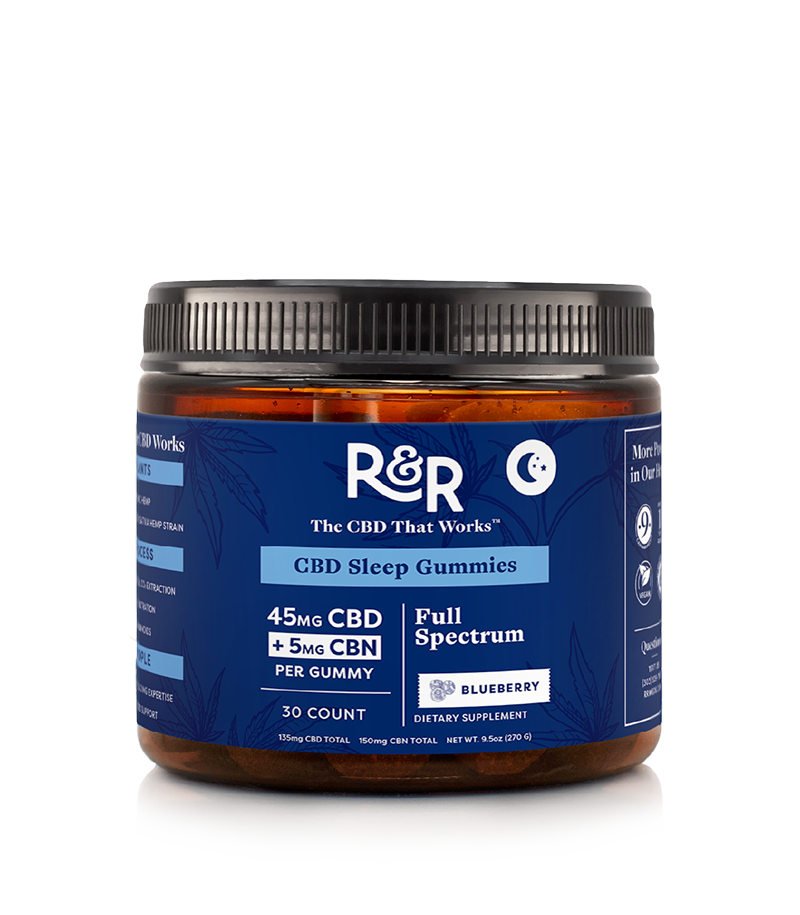Are you struggling to get a good night’s rest? Millions of people do, which explains why sleep supplements are in high demand. CBN and melatonin are two natural sleep aids that are gaining attention for their ability to promote relaxation and improve sleep quality.
While melatonin is a well-known hormone that regulates the sleep-wake cycle, CBN is a lesser-known cannabinoid derived from hemp, showing potential for calming effects. In this article, we’ll compare CBN and melatonin, exploring their differences and potential benefits to help you achieve restorative sleep.
Key Takeaways
-
CBN and melatonin promote better sleep by regulating the sleep-wake cycle, inducing relaxation, and alleviating pain or anxiety.
-
CBN offers other advantages beyond sleep support, such as reducing anxiety and inflammation.
-
Because their sleep-promoting properties complement each other, CBN and melatonin can be combined to create a comprehensive sleep-promotion strategy.
What Is CBN?
CBN forms when THC, the primary psychoactive compound in cannabis, breaks down over time. As cannabis ages, THC slowly converts into CBN through a process called oxidation. In essence, CBN is oxidized THC.
Unlike THC, CBN does not produce an intense "high" but instead exhibits potential therapeutic properties, including promoting relaxation and sleep. This explains its nickname, “the sleepy cannabinoid in old weed.”
Like other cannabinoids, CBN interacts with the body's endocannabinoid system (ECS). The ECS is a neuromodulatory system that regulates various physiological processes, including sleep, pain, and immune response, creating balance (homeostasis).
How CBN Differs from THC and CBD
While CBN, THC, and CBD are all cannabis cannabinoids, they have distinct differences in their effects and legal status.
THC is the primary psychoactive compound in cannabis that creates the "high" when you take cannabis. It binds strongly to CB1 receptors in the brain, producing intoxicating effects.
CBD, on the other hand, is non-intoxicating and displays potential health benefits, such as reducing anxiety and inflammation. It influences the ECS differently than THC due to its weaker affinity for CB1 receptors.
CBN falls in between THC and CBD. It has a mild affinity for CB1 receptors, which is much lower than THC. This means that while CBN may produce some psychoactive effects at high doses, it is generally non-intoxicating at the levels found in most products.
What Is Melatonin?
Melatonin is a hormone naturally produced by the pineal gland— a small, pea-sized gland in the brain. It plays a key role in regulating the sleep-wake cycle, also known as the circadian rhythm.
When darkness falls, the body's natural production of melatonin increases, signaling that it's time to prepare for sleep. Melatonin levels remain elevated throughout the night and decline in the early morning, promoting wakefulness as daylight approaches.
Melatonin supplements are commonly used to address various sleep disorders caused by circadian rhythm disruptions. They are often sought after by those looking to support sleep without relying on prescription drugs.
How Melatonin Works
Melatonin supplements raise the level of melatonin in the bloodstream. This mimics the natural rise in melatonin that occurs in the evening and helps to initiate the process of falling asleep.
Melatonin supplements can help reduce the time it takes to fall asleep (sleep latency). By improving sleep onset and maintenance, these supplements may also help increase the total duration of sleep.
Research shows that melatonin supplements can effectively manage jet lag and delayed sleep-wake phase disorder (DSWPD). Jet lag occurs when you travel across time zones, disrupting the body's internal clock, while DSWPD is a condition where your sleep pattern is significantly delayed compared to conventional bedtimes.
However, the effectiveness of melatonin supplements can vary among individuals. Some people may experience significant improvements in sleep quality, while others may notice little to no difference.
If melatonin doesn’t work for you, try implementing lifestyle changes. For example, take a warm bath in the evening, avoid bright lights and loud sounds, eat 2-3 hours before bed, and reduce caffeine and alcohol intake in the evening.
CBN vs Melatonin: Which is Better for Sleep?
While both compounds show promise in supporting sleep, they work through different mechanisms and may offer distinct benefits.
CBN's Potential Sleep Benefits
CBN's sedative properties are well-established in science, with some early research suggesting it may be more effective than CBD or THC for inducing sleep. CBN is thought to interact with the CB2 receptors to promote relaxation and reduce anxiety, thus improving sleep quality.
Additionally, CBN may help address secondary issues that can interfere with sleep, such as pain and inflammation, thus creating a more conducive environment for restful sleep.
However, it's important to note that research on CBN's sleep-promoting effects is still limited, and more studies are needed to fully understand its potential as a sleep aid.
Melatonin's Sleep-Regulating Effects
Melatonin, on the other hand, directly influences your body's sleep-wake cycle. By inducing higher melatonin levels, these supplements signal your body that it's time to wind down and prepare for sleep.
Melatonin supplements have been extensively studied for their effects on sleep, particularly in the context of jet lag and circadian rhythm disorders. They are shown to reduce sleep latency, increase total sleep time, and improve overall sleep quality in some individuals.
However, they may not be effective for certain types of sleep issues, such as insomnia caused by anxiety or chronic pain. In these cases, addressing the underlying cause of sleep disturbances may be more beneficial than relying solely on melatonin supplementation.
Combining CBN and Melatonin
While CBN and melatonin work through different pathways, they can be used together to enhance sleep-promotion. That’s because CBN's relaxing and pain-relieving properties complement melatonin's ability to regulate the sleep-wake cycle.
Some CBD and CBN products include melatonin in their formulations, offering a convenient way to combine these sleep-supporting compounds. However, it's always best to start with one product at a time and assess your response before combining supplements.
Safety and Side Effects
CBN and melatonin are generally considered safe, but it's essential to be aware of potential safety considerations.
Being a relatively new player in the sleep aid market, there’s limited research on CBN’s long-term safety and potential interactions with other medications. As a cannabis derivative, it also raises concerns about whether it can trigger a positive result for THC.
Melatonin, on the other hand, is more widely studied and is considered safe for short-term use. However, some people may experience side effects such as headaches, dizziness, nausea, and daytime sleepiness. Long-term use may also lead to dependence if the body relies on the supplemental melatonin and produces less of its own.
As a result, consult a healthcare professional before starting any new supplement regimen, especially if you have underlying health conditions or are taking other medications.
The Bottom Line
Melatonin and CBN have unique benefits and potential drawbacks, and what works for one person may not work for another person.
However, it’s good to know that melatonin is a well-established sleep aid that can help regulate the sleep-wake cycle and address circadian rhythm disruptions. It's also widely available and generally safe for short-term use.
CBN, while less researched, shows promise as a sleep-promoting compound that may help address underlying issues like anxiety and pain. It offers a natural alternative for those seeking a non-intoxicating sleep aid.
Ultimately, choosing between CBN and melatonin depends on your specific sleep issue(s) and preferences. If you're struggling with jet lag or shift work, melatonin may be the more reliable option, but if you're looking for a natural remedy that can help with sleep, pain, or anxiety, CBN might be worth exploring.
Can You Take CBN and Melatonin Together?
Some things work better in pairs—sugar and tea, wine and chocolate, milk and bread, just to mention a few. So, if you’re wondering if combining CBN and melatonin could offer even better sleep support, it’s understandable. After all, if both compounds show promise in promoting better sleep, wouldn't taking them together amplify their effects?
Well, CBN and melatonin can be safely taken together to provide a more comprehensive approach to sleep support.
Amplified Benefits or Redundancy?
When you take CBN and melatonin together, you're essentially targeting sleep from two angles. Melatonin helps regulate your sleep-wake cycle, signaling your body to wind down and prepare for sleep. CBN, on the other hand, promotes relaxation and may help address underlying issues that can interfere with sleep, such as anxiety or pain.
Combining these two compounds may enhance your sleep quality. Melatonin can help you fall asleep faster, while CBN may help you stay asleep longer and wake up feeling refreshed.
However, we all respond differently to sleep aids. For some people, taking CBN and melatonin together provides a synergistic effect and better sleep promotion.
How to Incorporate CBN into Your Sleep Routine

If you want to try CBN for better sleep, incorporating it into your nightly routine is simple. Here's what you need to know to get started.
Choosing the Right CBN Product
Always buy hemp products from reputable brands. This ensures the product is tested, safe, and of high quality.
CBN is available in various forms, including oils, capsules, and gummies. When deciding which product type to use, consider your personal preferences and lifestyle.
CBN oils and tinctures offer precise dosing and fast absorption when taken sublingually (under the tongue). Capsules provide convenient, pre-measured doses and are easy to take with water. Gummies, on the other hand, offer a tasty and discreet way to consume CBN.
Our full-spectrum CBD Sleep Gummies offer 45mg of CBD and 5mg of CBN in a melatonin-free package to prevent disrupting the body’s natural production of the hormone. Instead, they work naturally with your system to help effectively regulate your circadian rhythm.
You can also try these delicious CBD De-Stress Gummies to help you relax and calmly tackle life’s ebbs and flows. These Gummies contain ultra-calming CBG and CBN cannabinoids and our specially formulated de-stress blend of botanicals, including St. John’s Wort and chamomile.
By working naturally with the body, our Stress Gummies reduce social anxiety so you can feel happier, more relaxed, and more social, helping you achieve a healthier lifestyle and a greater sense of belonging.*
Timing and Dosage Considerations
To maximize the sleep-promoting effects of CBN, it’s vital to time your doses well. Most experts recommend taking CBN about an hour before bedtime to give it time to take effect.
Most CBN products will state the recommended dose. If not, we recommend starting with a low dose, around 5-10mg. If needed, increase the dose gradually until you find the sweet spot that works for you. Remember that everyone's optimal dose varies depending on their body weight, metabolism, and the severity of sleep issues.
Above all, be patient and consistent. It may take a few days or weeks of regular use to notice significant improvements in your sleep quality.
Complementary Sleep Hygiene Practices
While CBN can be a valuable tool for promoting better sleep, it's not a magic bullet. Combining CBN with good sleep hygiene can enhance the results and help you get better sleep.
Create a relaxing bedtime ritual to help you unwind and prepare for sleep. This might include taking a warm bath, reading a book, or practicing gentle stretching or meditation.
Ensure your sleep environment is conducive to rest by keeping your bedroom cool, dark, and quiet. Invest in a comfortable mattress and pillows that support your body well and promote proper alignment.
Limit exposure to blue light from electronic devices like smartphones, tablets, and computers in the hours before bedtime. The blue light emitted by these devices can interfere with your body's natural sleep cycle, making it harder to fall asleep.
Maintaining a consistent sleep schedule, even on weekends, helps to regulate your body's internal clock and improve the quality of your sleep. If possible, go to bed and wake up at the same time each day.
Is CBN a Viable Alternative to Melatonin for Sleep?
When choosing a sleep aid, consider your health needs and preferences. While melatonin has been a popular choice for many years, CBN is a promising alternative with unique benefits.
One of the main advantages of CBN over melatonin is that it addresses a wider range of sleep-related issues. It not only promotes relaxation and helps you fall asleep faster but also helps you stay asleep longer and improves the overall quality of your sleep.
Melatonin, on the other hand, primarily regulates your sleep-wake cycle. While this can be helpful for jet lag or shift work, it may not effectively address underlying issues that contribute to poor sleep, such as chronic pain or anxiety.
Another benefit of CBN is its safety profile. Some people experience grogginess, headaches, or vivid dreams when taking melatonin, especially at higher doses. However, CBN, being natural, is generally well-tolerated and has fewer reported side effects.
When to Consider CBN over Melatonin
If you've tried melatonin in the past and found it ineffective or experienced unwanted side effects, CBN may be worth exploring. CBN's unique properties make it particularly useful for those dealing with sleep issues related to pain, inflammation, or anxiety.
Additionally, if you're looking for a sleep aid that can help you not only fall asleep but also improve the quality and duration of your sleep, CBN may be a better choice. CBN's interaction with the ECS can promote a more balanced, restorative sleep experience.
Potential Advantages of CBN for Long-Term Use
Long-term melatonin use increases the potential for dependence and reduces natural melatonin production. Over time, your body may over-rely on supplemental melatonin, making it harder to fall asleep without it.
CBN, on the other hand, works with your body's natural systems to promote better sleep. It doesn't directly affect your melatonin levels, which means there's less risk of developing a dependence or experiencing a rebound effect when you stop taking it.
Moreover, CBN's anti-inflammatory and pain-relieving properties may provide additional benefits beyond sleep, making it a more comprehensive choice for long-term wellness.
About R&R CBD
At R&R CBD, our mission is to help you quickly and naturally regain control of your well-being so you can live life to the fullest.
We believe everyone deserves access to effective relief that works. By offering the highest-quality CBD on the market, we’re putting a holistic solution into your hands that can make your life better.*
That’s why we’ve developed all-natural ways for you to feel better. We guarantee your pain will diminish, you’ll feel calmer, and sleep more soundly.*
Visit our website to learn more about us and our high-quality CBD-based products designed to improve your overall well-being.
Frequently Asked Questions
Does CBN Make You Sleepy?
CBN is often associated with sleep-inducing effects, and many people use it as a natural sleep aid. It’s believed to promote relaxation, which may help with falling asleep.
What Is CBN Best for?
CBN is best known for its potential to help with sleep and relaxation. It may also have anti-inflammatory, pain-relieving, and antibacterial properties that could benefit sleep.
Is CBN Good for Anxiety?
CBN may help with anxiety, as it has calming and relaxing effects. However, it is not as widely studied for anxiety relief as CBD, so its effectiveness for this purpose can vary.
What Does CBN Do to the Brain?
CBN interacts with the body’s endocannabinoid system, promoting relaxation and helping with sleep. Moreover, it’s not psychoactive, meaning it does not produce a high.
Sources
- Cannabinol and Neuroscience
- Recent Cannabinoid Research
- CBD and Sleep Disorders
- Effects of Cannabinoids on Sleep
- Endocannabinoid System and Sleep
- Melatonin: What You Need to Know
- CBD and Anxiety Relief
- Cannabinoids and REM Sleep
- Melatonin and Sleep Quality
- CBD for Insomnia
- Melatonin Supplement Guide
- THC and Sleep Patterns
- Blue Light and Sleep Disruption


































